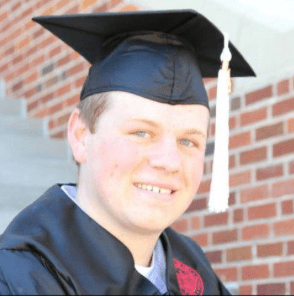By Amen Oyiboke
When the school bell rings and classes are done for the day, most students rejoice because it’s time to get away from schoolwork and go home.
As a youngster, 9-year-old Brad Brooks didn’t want to go home. At the time, school was his haven from the harsh realities of family life. Growing up in Oklahoma City, Brooks’ childhood was anything but perfect.
He was one of three children raised by a single mother who suffered from mental illnesses and illicit drug use. Going home meant dealing with the uncertainty of whether she would be there.
“I was more of myself at school because at home I couldn’t be. I was always fearful of not finding my mom there,” Brooks recalled. “Sometimes she would leave the house for days and never call us. So I was kind of the head of household. At 9 years old, I was taking care of my mom and my sister. It was a lot to handle at a young age.”
Brooks fell in love with the foundation provided by school and the care of his teachers.
“The teachers and I really connected,” he said. “I loved the environment. It was so exciting for me to learn new things every day and have teachers that really cared.”
Difficult as life was, Brooks found confidence in the relationship he formed with his third grade teacher. Through that relationship he found psychological and educational help that would shape the choice of his career.
“Ms. McConnell stepped in and intervened for me. She gave me the help that I needed as a child. Her kindness really put me on the right track,” he said. “I wanted to have that type of impact on someone’s life. So, at 9 years old, I decided to go into education.”
That dream ultimately led to the USC Rossier School and the Postsecondary Administration and Student Affairs (PASA) program.
Brooks wanted to attend college, an accomplishment no one in his family had achieved. Through hard work and encouragement from teachers, Brooks graduated from high school and was accepted to the University of Oklahoma.
“During my undergraduate studies, I became involved with the McNair Scholars program. It was a federally funded educational opportunity for students from underrepresented areas in higher education,” he said.
“It’s through that program my sophomore/junior year that I became involved with research and wanting to contribute to the experiences of first-generation college students. That led me to apply for my master’s degree at the Rossier School of Education and I got in,” he added.
Once accepted into USC Rossier, Brooks applied for and received the Lionel DeSilva Endowed Scholarship, which helped ease his financial burden.
“That scholarship really helped me get through my first semester at USC,” he said. “I received the scholarship before I moved to Los Angeles, and it really gave me hope about seeking my Postsecondary Administration and Student Affairs master’s degree.”
Now after completing the first year in his master’s program, Brooks believes the first step in helping students gain confidence in education begins with the administration.
“In order to really make a difference for students who come from my background, you have to really be a part of the administration,” he said. “It starts with dialogue among administrators figuring out how to be more inclusive to students from low-income backgrounds.
“Education has done so much for me in my life, I just want to pay it forward,” he added.
The faculty at USC Rossier plays a major role in the success of students like himself, Brooks said.
“One of the best professors I’ve had in USC Rossier is Tracy Tambascia,” he said. “She is like the PASA mom. She is genuinely concerned with anything you may be facing in school. She’s been like an unofficial mentor for me. She comes from similar struggles in her life, and when I look at her, she gives me so much inspiration.”
